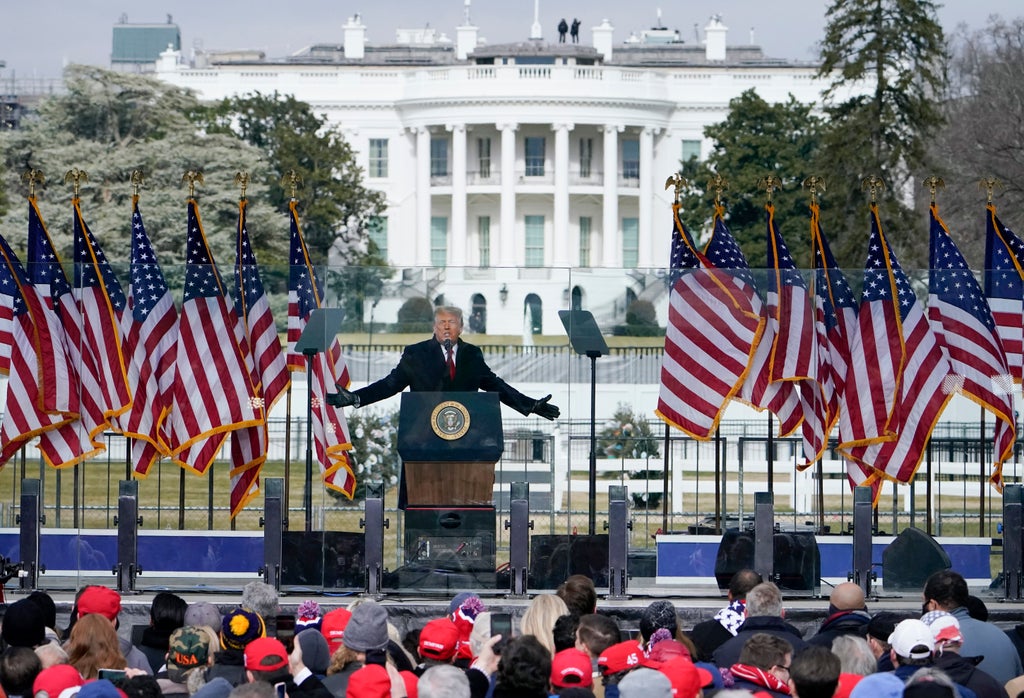
The House select committee investigating the 6 January insurrection is now in possession of more than 750 pages of Trump White House records it requested as part of its probe into the worst attack on the Capitol since the 1814 Burning of Washington.
In a statement, a spokesperson for the National Archives and Records Administration (Nara) said the agency “provided the Select Committee with all the records at issue in the litigation” on Thursday evening.
The spokesperson added that Nara will continue producing documents in response to the committee’s request “on an ongoing basis”.
The records, which include such documents as a “draft text of a presidential speech for the January 6, 2021, Save America March; a handwritten list of potential or scheduled briefings and telephone calls concerning election issues; and a draft Executive Order concerning election integrity … a draft proclamation honoring deceased Capitol Police officers Brian Sicknick and Howard Liebengood, and associated e-mails from the Office of the Executive Clerk, which relate to the Select Committee’s interest in the White House’s response to the Capitol attack,” could provide the panel with further insights into what was happening at the Trump White House before, during, and after a pro-Trump mob stormed the Capitol in hopes of disrupting Congress’ quadrennial certification of electoral college results.
The committee of seven Democrats and Republicans Liz Cheney and Adam Kinzinger has already reviewed thousands of documents and has had more than 400 witnesses give evidence since it was charged with investigating the Capitol insurrection last summer.
According to a committee source, members and staff have been investigating along several different lines of inquiry, one of which includes efforts by Mr Trump and his allies to pressure then-Vice President Mike Pence to unilaterally reject electoral votes from several swing states in order to install Mr Trump for a second term against the wishes of American voters.
The panel is also looking into whether Mr Trump took any action to quell the violence that day, and has spoken to witnesses who have described the former president as having relished the sight of his supporters swarming the Capitol.
The select committee’s receipt of the Trump-era White House records comes as members and staff are preparing to unveil their findings in a series of public hearings, and nearly 10 months after the chairs of the House Oversight, Intelligence, Judiciary, Armed Services, Administration, and Homeland Security committees first asked Archivist of the United States David Ferriero and White House Chief of Staff Ron Klain to produce a slew of documents from the prior administration pertaining to the events of 6 January.
Mississippi Representative Bennie Thompson, who chairs both the House Homeland Security Committee and the January 6th Select Committee, renewed the request to Mr Ferriero in a 25 August letter asking Nara to produce all “documents and communications received, prepared, or sent between December 1, 2020, and January 20, 2021, relating to the counting of the electoral college vote on January 6, 2021, the potential for demonstrations, violence, or attacks in the National Capital Region on or around January 6, 2021, and the events or aftermath of January 6, 2021”.
Many such records would normally be shielded from Congress by executive privilege — a legal doctrine that protects communications between and among a president and his advisers — but the current president, Joe Biden, declined to assert the privilege over any of them, citing what White House Press Secretary Jen Psaki called the “unique and extraordinary circumstances” of the Capitol attack.
In a October letter to Mr Ferriero, White House Counsel Dana Remus said Mr Biden had “determined that an assertion of executive privilege is not in the best interests of the United States” because the select committee is “examining an assault on our Constitution and democratic institutions provoked and fanned by those sworn to protect them, and the conduct under investigation extends far beyond typical deliberations concerning the proper discharge of the President’s constitutional responsibilities”.
While Nara was set to begin transmitting the documents to the select committee shortly thereafter, Mr Trump sued to block the committee from obtaining any of the records on the grounds that he still had the right to assert executive privilege over them despite what Mr Biden had already determined.
On 9 November, US District Judge Tanya Chutkan denied Mr Trump’s request for an injunction blocking transmittal of the documents to the committee, writing in her opinion that Mr Trump had “not acknowledge[d] the deference owed to the incumbent president’s judgment”.
“His position that he may override the express will of the executive branch appears to be premised on the notion that his executive power ‘exists in perpetuity’. But Presidents are not kings, and Plaintiff is not President,” she wrote.
A month later, a three-judge panel of the US Court of Appeals for District of Columbia upheld Judge Chutkan’s ruling in a opinion holding that Mr Trump “provided no basis for this court to override President Biden’s judgment and the agreement and accommodations worked out between the Political Branches over these documents”.
Writing for the unanimous panel, Circuit Judge Patricia Millett wrote that “the profound interests in disclosure” cited by Mr Biden and the select committee “far exceed his generalized concerns for Executive Branch confidentiality”.
“To allow the privilege of a no-longer-sitting President to prevail over Congress’s need to investigate a violent attack on its home and its constitutional operations would ‘gravely impair the basic function of the’ legislature,” she wrote.
Mr Trump filed a further appeal of the Circuit Court’s ruling with the US Supreme Court just before Christmas, but on Wednesday the court issued an order declining to hear the former president’s case or issue any further orders blocking Nara from transmitting the records to the committee.
Eight of the nine justices — including all three appointed by Mr Trump — concurred in the ruling.







